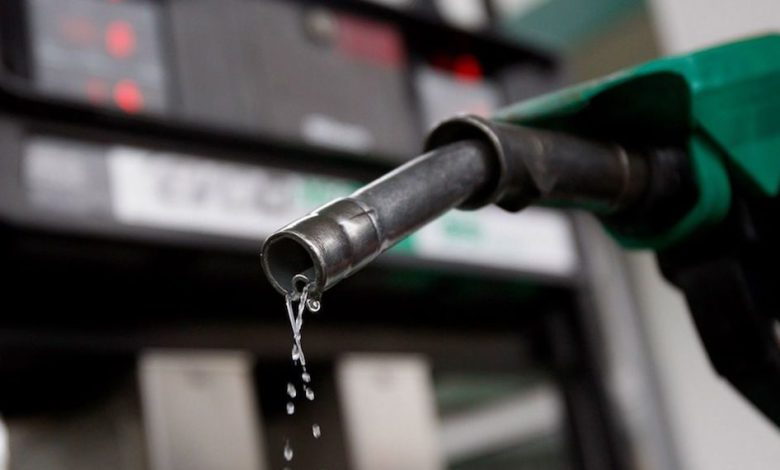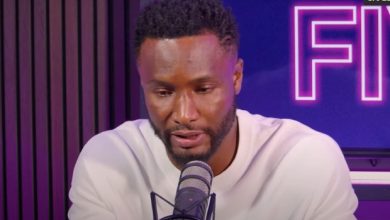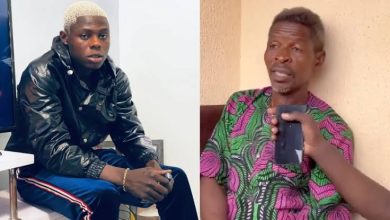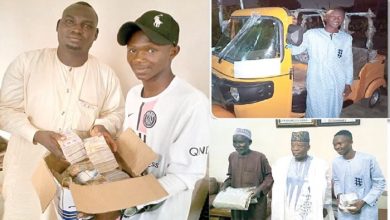Petrol N617: Price may go up again in 45 days, expert warns of bumpy road ahead
Petrol N617: Price may go up again in 45 days, expert warns of bumpy road ahead

Peter Esele is a former President of the Petroleum and Natural Gas Senior Staff Association of Nigeria (PENGASSAN). With his vast knowledge of the oil industry, Esele speaks on the increases in the price of petrol occasioned by subsidy removal.
From about N149 petrol at the time President Bola Tinubu assumed office on May 29, a day he declared that “subsidy is over”, the price of the product has moved to over N500, before jumping to around N617 last week.
What can you tell us about the way the removal of fuel subsidy and petrol price increase is panning out in the country?
What we have is that marketers are making a kill. They don’t buy fuel from the depot every day. So if they still have the old stock and they are selling at the new price, what we are experiencing is that they have decided to maximize profit. In the other states where they sell at the former price, in a deregulated market, the only thing that matters is the morality of the owner of the retail outlet.
So, if the man has the moral that he bought at X price and decided to stick to it until the product is completely exhausted. So, it is strictly a question of morality. There are people who will go out there and say “This is a window, let me make so much money out of this window”.
The other aspect is that the last time we spoke, I told you we were going to pay higher for fuel in July. The reason for this is that the Nigerian National Petroleum Corporation, NNPC, normally does between 60 and 90 days’ stock.
It is expected that the stock they got is different from the previous ones they got which was less than N550 to the dollar.
NNPC can get the dollars at N463 but if I am to look at what the others may get, it is about N550 three months ago, that was where NNPC was. Where is NNPC now? If they are to import, they could get dollars at N463 before the advent of this administration.
So now, if NNPC is importing at about N750, they cannot sell at the former price. These are where the changes would come about. Again, you also know that the international price of crude has also gone up and you have a falling naira.
It is like a double warning. These are our new challenges, new reality; new normal. So, the price of petrol may just be N617 in Abuja, N568 in Lagos, but what we are going to have is that this price may likely maintain itself for another 30 to 45 days, except we have new increases in crude oil prices. That is the challenge we may have to face.
Naira value has of late been falling, meaning that this price will keep going up. Is that correct?
Yes. You are going to have the price going up but the way you put it is frightening. It may not be as frightening as that.
There are two things we need to do. Our excess liquidity is quite low. What we are going to do is for the country to take advantage of the current price increase of crude oil. Unfortunately, we are about 500, 000 to 600, 000 barrels short of our daily production quota as fixed by the Organisation of Petroleum Exporting Countries, OPEC. That in itself is over $60 million daily that we are losing. That’s one of the challenges.
The second one is that we have pressure on FX because there are no local refineries. I was thinking that before this time, we would be getting at least 30% (petrol) from Dangote Refinery before they go full stream but I don’t know what is happening there anymore and I had a meeting with PENGASSAN two weeks ago where we tabled these challenges.
The road ahead is going to be bumpy and tough but government needs to do something that will mitigate these challenges in this honey period before the honey disappears.
The Nigeria Labour Congress, NLC, has always agitated that government must put certain things in place before removing oil subsidy. Do you think those conditions had been met?
No. Those conditions have not been met. It is not just in this tenure because we have a government that is barely two months old and one of the things the NLC has always been saying is “fix our local refineries so we don’t have pressure on FX”.
If you are getting your products, what you are having now is huge pressure on FX and, by September, we are going to have about 20, or a minimum of 10 more companies to help bring in this product. So, we are going to have more pressure on FX. If you don’t have local refineries, and pressure mounts on FX, importers of the product may not get dollars from the Central Bank of Nigeria, CBN, and would have to go to the parallel market so as to remain in business.
And going to the parallel market will further devalue the naira because one thing about economics is not about perception. If everybody is worried as we are, right now, no matter what you do, the perception is that we are sinking. So, what we need to do NLC has talked about. Just imagine that from the government of Obasanjo till date, we are always talking about refineries not working. Former President Buhari promised to build two refineries; this was not done throughout his eight years. What I want everybody to do is to go beyond the salary increase.
Do you really say marketers are making a kill when they are not sure of the price they are going to buy when next they go to the depot?
I didn’t generalize. I said some of the marketers. If you still have a product in-house, why increase the price? If I buy a product at N40 and sell at N50 and, suddenly, where I go to buy it, the price has increased to N60, does that mean that I‘ll start selling at N60? No, because the last time I bought it I bought it at N40 and sold it at N50. So, why don’t I stick to N50? That is why I said that it is an issue of morality. I am not putting them all in one basket because I know that some stick to their price due to their morality while others are taking advantage out of fear of what might happen tomorrow.
Some argue that the fuel subsidy removal could have been done better. What is your take?
Well, they say this could have been done better but when you are outside, there is certain information that you are not aware of until you become the President. So, the President has to look at the finances of the country. Again, irrespective of what the presidential candidates were saying, the three major political parties all agreed that they were going to remove fuel subsidies. The process of doing it was difference.
I was an advocate of gradual subsidy removal but what I learnt from this administration is that, even if you want to take away 25%, how do we know what we are paying? This is the first time I know the actual amount of fuel we consume daily. Right now, we are consuming 46.6 million litres of petrol per day. Before this, it was 70 million litres. So, if they had done 25%, we would never have had these figures and the government would have reduced subsidy for two months and the whole thing would balloon again and we go back to square one.
That was the information I got from the players in this administration on why they had to do what they are doing. Then, on whether this would have been done long ago when you talk about what happened during former President Jonathan’s administration, opposition parties are there to take power. The first thing you have to do is to find out if what you are opposing will give you power. That is what opposition parties are all about. They are interested in how to get power. As citizens, we also have to look at what is in our own best interest.
What is happening across the country now is that those struggling to survive are spending about 70% of their earnings on transportation. Recently, the total amount that was shared as allocations from the Federation Account was about N799 billion. Most people ask how the money is going to be used. It is not the responsibility of the Federal Government to provide buses in states; it is the responsibility of the state government. The Federal Government can say “Contribute 50%”.
That is what is supposed to be done in the federal system of government that we are running. The Federal Government cannot provide buses for any state but can guarantee a manufacturer to produce buses for it to buy and distribute to states.
We are being told that the price of fuel could come up or go down. Could that be a political statement?
No. It is not a political statement. It is going to come down, that’s the law of supply and demand. You also know that crude is a commodity and every commodity has booms and bursts, they are all cyclical. What triggered this was that Saudi Arabia withdrew millions of barrels from the market has also cut production.
Meanwhile, we are not even able to meet our production quota. If we have all that in place and we have enough dollars, that will ease the liquidity squeeze that is currently going on. So, let’s assume we go into winter when crude prices fluctuate. That will definitely come, just as we have it in the stock market. What goes up must surely come down. So, it is not a political statement.
The price will rise due to fundamentals such as the falling naira, and inability to access FX. Presently, there are two windows that are merging. The Federal Government wants to have convergence. Those who get dollars at the parallel market may not even be able to sell at N640.
Those are the factors we must look at but I am optimistic that these prices will go down but government needs to create a way to enable Nigerians to breathe so that when it starts running, they will be alive to enjoy it.
What is the cause of the delay in Dangote entering the market? Is he watching the market? Since he is producing and not importing, is it likely that prices will come down or at least stabilize?
Now, the market is very good for Dangote’s entry but I think Dangote is in the best position to answer that question because, by his own projection, he said July, so let us hope that before the month runs out, we see fuel coming out from Dangote Refinery.
In terms of whether he is watching the market, I think the market is ripe for everybody to come in because, for the past two months, the government has shown that they are not intervening. The government is going to allow market forces to take control. So, I think it is very good for players to come in now.
We understand that Nigeria gets less valuable on the crude we export. What’s your take?
That is true but it has to do with the capacity of our leaders. You see, for the past two months, Nigeria has been making new mistakes and that is good. It’s when you keep repeating old mistakes that you are not growing.
New mistakes are evidence of growth. On the question of gas, Nigeria is actually a gas country. Our gas reserves at the moment are over $3trillion. So, if we allow private investors to come in, it’s going to benefit government and the people. A Nigerian company is currently investing $ 5 billion in gas and once the market is available, it will be easier to for us to move on.
I think the government has to do more in terms of communicating with the people. When the news of the new fuel price was broken, people were really angry. I spoke with someone in Abuja who said he bought a litre at N500 while another person said he bought his at N615, just 45 minutes after. What government should do is communicate this to Nigerians and let them know that the prices are up. The shock we are experiencing is a new reality that we are in, no change is ever easy, not to talk of this difficult one.
So, in Nigeria, the media are all going to talk to Nigerians, letting them know that they will pay less when prices go down, just as it is in the case of gas. I also hope that marketers will reduce their prices once they go down. The government needs to do more in effective communication. Let people be aware. Again, the government needs to hit the ground running now by looking for intervention measures to carry out. If the government doesn’t do that, the prices of crude are still going to be higher due to the OPEC cut.






